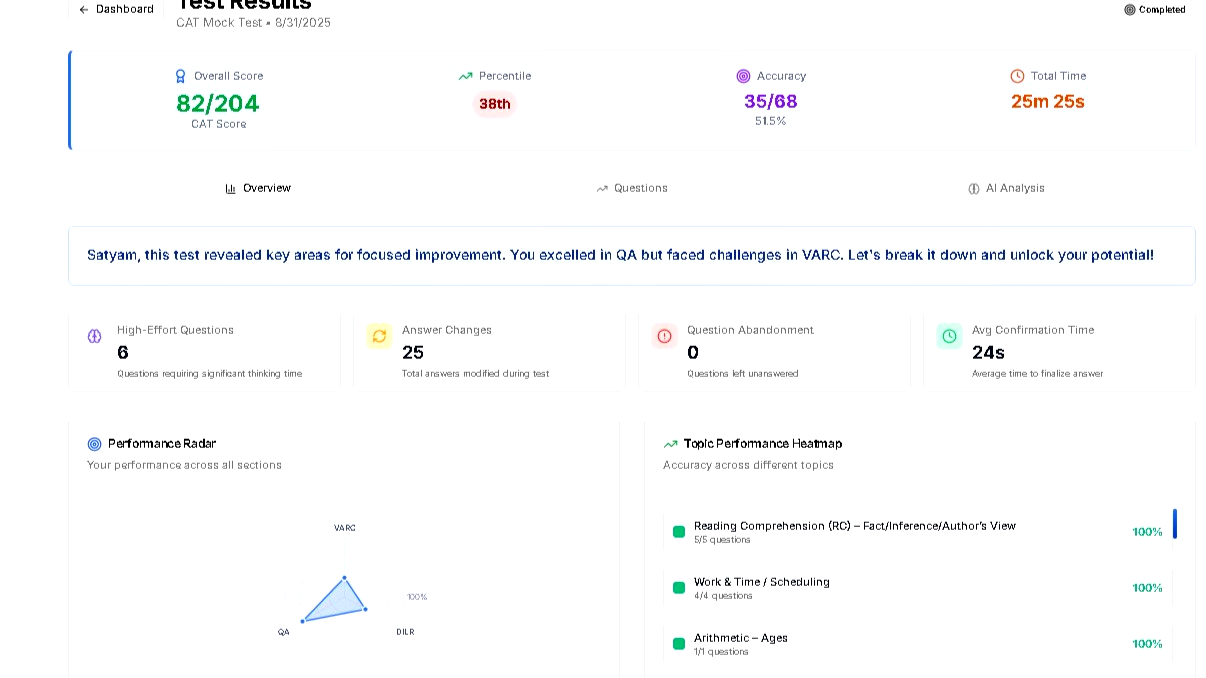Mock tests are the cornerstone of successful CAT preparation, serving as the bridge between theoretical knowledge and actual exam performance. These practice examinations simulate real test conditions while providing invaluable insights into your strengths, weaknesses, and time management skills.[1][2]
Why CAT Mock Tests Are Non-Negotiable for Success
Realistic Exam Simulation
CAT mock tests replicate the actual exam environment with identical question patterns, difficulty levels, and time constraints. This simulation helps candidates familiarize themselves with the computer-based test format, reducing anxiety and improving confidence on exam day.
Key simulation benefits include:
Adaptive testing experience similar to the actual CAT
Time pressure management under realistic conditions
Interface familiarity with the official exam software
Question navigation practice and strategy development
Performance Analysis and Gap Identification
The most significant value of CAT mock tests lies in their detailed performance analytics. Modern mock test platforms provide comprehensive reports that break down your performance across:
Sectional Analysis
Quantitative Aptitude accuracy and speed metrics
Verbal Ability and Reading Comprehension comprehension rates
Data Interpretation and Logical Reasoning pattern recognition skills
Question-Level Insights
Time spent per question type
Accuracy rates for different difficulty levels
Common error patterns and mistake categories
Comparison with peer performance percentiles
Strategic Approaches to Mock Test Utilization
Progressive Difficulty Implementation
Successful CAT candidates follow a structured mock test progression:
Foundation Phase (3-4 months before exam)
Take 1-2 mock tests weekly
Focus on understanding question patterns
Build basic time management skills
Intensive Phase (2 months before exam)
Increase frequency to 3-4 mock tests weekly
Implement advanced solving strategies
Refine sectional time allocation
Final Phase (1 month before exam)
Daily mock test practice
Perfect exam day routine
Fine-tune weak areas identified
Comprehensive Analysis Methodology
Immediate Post-Test Analysis
Review all incorrect answers within 24 hours
Identify conceptual gaps versus silly mistakes
Document recurring error patterns
Note time management inefficiencies
Weekly Performance Review
Compare scores across multiple mock tests
Track improvement trends by section
Adjust study plan based on performance data
Set realistic score targets for next attempts
Time Management Mastery Through Mock Tests
Optimal Section Strategy Development
Mock tests reveal your natural solving pace and help determine the most effective sectional approach:
Sequential Approach: Attempting sections in order
Strength-First Strategy: Starting with your strongest section
Cherry-Picking Method: Selecting easiest questions first within each section
Question Selection Techniques
Through consistent mock test practice, candidates develop intuitive question selection skills:
30-Second Rule: Decide within 30 seconds whether to attempt a question
Difficulty Assessment: Quickly categorize questions as easy, medium, or difficult
Return Strategy: Mark questions for later review and return systematically
Technology Integration and Smart Practice
AI-Powered Mock Test Platforms
Modern CAT preparation leverages artificial intelligence for personalized mock test experiences:
Adaptive difficulty adjustment based on performance
Personalized question recommendations
Predictive score analysis using machine learning
Weakness-targeted practice sets
Mobile Learning Integration
Optimize mock test practice with mobile-compatible platforms that enable:
Quick practice sessions during commute
Instant performance notifications
Peer comparison features
Progress tracking across devices
Mock Test Analysis: Converting Data into Strategy
Score Interpretation Framework
Understanding mock test scores requires contextual analysis:
Percentile vs. Absolute Score Focus
Percentile rankings provide competitive positioning
Absolute scores indicate concept mastery levels
Sectional cut-offs determine overall qualification chances
Consistent performance matters more than peak scores
Performance Trend Analysis
Track these key metrics across multiple attempts:
Overall percentile progression
Sectional improvement rates
Accuracy vs. attempt ratio
Time management consistency
Common Mock Test Mistakes and Solutions
Over-Analysis Paralysis
Problem: Spending excessive time analyzing every mock test detail
Solution: Focus on top 3 improvement areas per test
Score Obsession
Problem: Getting demotivated by fluctuating scores
Solution: Emphasize learning over scoring in initial phases
Irregular Practice Schedule
Problem: Inconsistent mock test frequency
Solution: Create a fixed weekly mock test calendar
Advanced Mock Test Strategies for High Scorers
Sectional Test Integration
Supplement full-length mocks with targeted sectional tests:
Daily mini-mocks for specific topics
Timed sectional practice for weak areas
Speed building exercises for strong sections
Accuracy improvement drills for error-prone topics
Peer Learning and Comparison
Leverage community-driven analysis through:
Mock test discussion forums
Peer performance comparisons
Strategy sharing with high scorers
Group analysis sessions
FAQ Section
How many mock tests should I take for CAT preparation?
Ideally, attempt 40-50 full-length mock tests over 4-6 months of preparation, with increased frequency closer to the exam date.
When should I start taking CAT mock tests?
Begin mock test practice 3-4 months before the CAT exam date, after completing basic conceptual preparation in all three sections.
Should I focus more on accuracy or attempts in mock tests?
Balance both gradually - start with accuracy focus in initial mocks, then gradually increase attempts while maintaining reasonable accuracy levels (70-80%).
How do I handle poor mock test scores?
Analyze patterns rather than individual scores - identify specific weakness areas, adjust study strategy accordingly, and focus on consistent improvement over time.
Which mock test series provides the most accurate CAT simulation?
Choose mock test series that closely replicate CAT's difficulty level and interface, with detailed analytics and peer comparison features from reputable coaching institutes.
Mock tests transform CAT preparation from passive learning to active skill development, providing the practice, analysis, and confidence needed for exam success. The key lies not just in taking mock tests, but in systematically analyzing performance data and continuously refining your approach based on insights gained.




